Deck 9: Rotation
Question
Question
Question
Question
Question
Question
Question
Question
Question
Question
Question
Question
Question
Question
Question
Question
Question
Question
Question
Question
Question
Question
Question
Question
Question
Question
Question
Question
Question
Question
Question
Question
Question
Question
Question
Question
Question
Question
Question
Question
Question
Question
Question
Question
Question
Question
Question
Question
Question
Question
Question
Question
Question
Question
Question
Question
Question
Question
Question
Question
Question
Question
Question
Question
Question
Question
Question
Question
Question
Question
Question
Question
Question
Question
Question
Question
Question
Question
Question
Question

Unlock Deck
Sign up to unlock the cards in this deck!
Unlock Deck
Unlock Deck
1/119
Play
Full screen (f)
Deck 9: Rotation
1
A wheel is rotating at 30 rev/min. The angular velocity of the wheel is
A) 2 2 rad/s
B) 2 rad/s
C) 2 rad/s
D) /2 rad/s
E) rad/s
A) 2 2 rad/s
B) 2 rad/s
C) 2 rad/s
D) /2 rad/s
E) rad/s
rad/s
2
A record turntable rotates through 5.0 rad in 2.8 s as it is accelerated uniformly from rest. What is the angular velocity at the end of that time?
A) 0.60 rad/s
B) 0.90 rad/s
C) 1.8 rad/s
D) 3.6 rad/s
E) 14 rad/s
A) 0.60 rad/s
B) 0.90 rad/s
C) 1.8 rad/s
D) 3.6 rad/s
E) 14 rad/s
3.6 rad/s
3
A wheel rotates through 6.0 rad in 2.0 s as it is uniformly brought to rest. The initial angular velocity of the wheel before braking began was
A) 0.60 rad/s
B) 0.90 rad/s
C) 1.8 rad/s
D) 6.0 rad/s
E) 7.2 rad/s
A) 0.60 rad/s
B) 0.90 rad/s
C) 1.8 rad/s
D) 6.0 rad/s
E) 7.2 rad/s
6.0 rad/s
4
A point P is at a distance R from the axis of rotation of a rigid body. The linear speed, centripetal acceleration, and tangential acceleration of the point can be expressed as
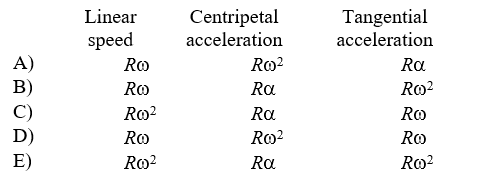


Unlock Deck
Unlock for access to all 119 flashcards in this deck.
Unlock Deck
k this deck
5
A body that moves with a constant speed in a circle
A) experiences no acceleration.
B) undergoes no change in velocity.
C) has no resultant force acting on it.
D) has no work done on it.
E) is described by all of these.
A) experiences no acceleration.
B) undergoes no change in velocity.
C) has no resultant force acting on it.
D) has no work done on it.
E) is described by all of these.

Unlock Deck
Unlock for access to all 119 flashcards in this deck.
Unlock Deck
k this deck
6
The Empire's space station is a long way from any star. It is circular and has a radius of 5.10 km. The angular velocity that is needed to give the station an artificial gravity of 9.80 m/s2 at its circumference is
A) 4.4 10-2 rad/s
B) 7.0 10-3 rad/s
C) 0.28 rad/s
D) - 0.22 rad/s
E) 1.3 103 rad/s
A) 4.4 10-2 rad/s
B) 7.0 10-3 rad/s
C) 0.28 rad/s
D) - 0.22 rad/s
E) 1.3 103 rad/s

Unlock Deck
Unlock for access to all 119 flashcards in this deck.
Unlock Deck
k this deck
7
The London Eye, which is a giant Ferris wheel, has a diameter of 135 m. It revolves at a constant rate and takes 30 minutes to complete one revolution. What is the linear velocity of a rider in a capsule that is located at the perimeter of the wheel?
A) 0.24 m/s
B) 0.47 m/s
C) 3.5 m/s
D) 7.1 m/s
E) None of the above
A) 0.24 m/s
B) 0.47 m/s
C) 3.5 m/s
D) 7.1 m/s
E) None of the above

Unlock Deck
Unlock for access to all 119 flashcards in this deck.
Unlock Deck
k this deck
8
Two points, A and B, are on a disk that rotates about an axis. Point A is closer to the axis than point B. Which of the following is not true?
A) Point B has the greater speed.
B) Point A has the lesser centripetal acceleration.
C) Points A and B have the same angular acceleration.
D) Point B has the greater angular speed.
E) Point A has the lesser tangential acceleration.
A) Point B has the greater speed.
B) Point A has the lesser centripetal acceleration.
C) Points A and B have the same angular acceleration.
D) Point B has the greater angular speed.
E) Point A has the lesser tangential acceleration.

Unlock Deck
Unlock for access to all 119 flashcards in this deck.
Unlock Deck
k this deck
9
Two points, A and B, are on a disk that rotates about an axis. Point A is three times as far from the axis as point B. If the speed of point B is v, then what is the speed of point A?
A) v
B) 3v
C) v/3
D) 9v
E) v/9
A) v
B) 3v
C) v/3
D) 9v
E) v/9

Unlock Deck
Unlock for access to all 119 flashcards in this deck.
Unlock Deck
k this deck
10
When an object is moving in a circle at constant speed, its acceleration is
A) constantly increasing.
B) constant in direction.
C) zero.
D) constant in magnitude.
E) constant in both magnitude and direction.
A) constantly increasing.
B) constant in direction.
C) zero.
D) constant in magnitude.
E) constant in both magnitude and direction.

Unlock Deck
Unlock for access to all 119 flashcards in this deck.
Unlock Deck
k this deck
11
A wheel rotates with a constant nonzero angular acceleration. Which of the following quantities remains constant in magnitude?
A) , tangential velocity
, tangential velocity
B) r, radial acceleration
r, radial acceleration
C) t, tangential acceleration
t, tangential acceleration
D) , angular velocity
, angular velocity
E) All of these are correct.
A)
 , tangential velocity
, tangential velocityB)
 r, radial acceleration
r, radial accelerationC)
 t, tangential acceleration
t, tangential accelerationD)
 , angular velocity
, angular velocityE) All of these are correct.

Unlock Deck
Unlock for access to all 119 flashcards in this deck.
Unlock Deck
k this deck
12
You are pedaling a bicycle at 9.8 m/s. The radius of the wheels of the bicycle is 51.9cm. The angular velocity of rotation of the wheels is
A) 19 rad/s
B) 2.5 rad/s
C) 4.5 rad/s
D) 3.0 rad/s
E) 6.3 rad/s
A) 19 rad/s
B) 2.5 rad/s
C) 4.5 rad/s
D) 3.0 rad/s
E) 6.3 rad/s

Unlock Deck
Unlock for access to all 119 flashcards in this deck.
Unlock Deck
k this deck
13
A particle is moving uniformly in a circle of radius 50 cm. Its angular velocity is 96 rad/s. The linear speed of the particle is
A) 1.0 m/s
B) 96 cm/s
C) 48 m/s
D) zero
E) 15 m/s
A) 1.0 m/s
B) 96 cm/s
C) 48 m/s
D) zero
E) 15 m/s

Unlock Deck
Unlock for access to all 119 flashcards in this deck.
Unlock Deck
k this deck
14
Two objects, m1 and m2, both of mass m, are placed on a horizontal platform which is rotating at a constant angular velocity. m1 is located at a distance  R from the axis of rotation and m2 is located at a R. The tangential acceleration of mass m1 ____ to the tangential acceleration of m2.
R from the axis of rotation and m2 is located at a R. The tangential acceleration of mass m1 ____ to the tangential acceleration of m2.
A) is less than
B) is equal to
C) is greater than
D) depends how fast it is rotating
E) unable to tell
 R from the axis of rotation and m2 is located at a R. The tangential acceleration of mass m1 ____ to the tangential acceleration of m2.
R from the axis of rotation and m2 is located at a R. The tangential acceleration of mass m1 ____ to the tangential acceleration of m2.A) is less than
B) is equal to
C) is greater than
D) depends how fast it is rotating
E) unable to tell

Unlock Deck
Unlock for access to all 119 flashcards in this deck.
Unlock Deck
k this deck
15
Starting from rest, a disk rotates with constant angular acceleration. If it takes 10 rev to reach an angular velocity , then how many additional revolutions are required to reach an angular velocity 2 ?
A) 10 rev
B) 20 rev
C) 30 rev
D) 40 rev
E) 50 rev
A) 10 rev
B) 20 rev
C) 30 rev
D) 40 rev
E) 50 rev

Unlock Deck
Unlock for access to all 119 flashcards in this deck.
Unlock Deck
k this deck
16
Two objects, m1 and m2, both of mass m, are place on a horizontal platform which is rotating at a constant angular velocity. m1 = m is located at a distance R from the axis of rotation and the second object of mass m2 = 2m is located at a distance 2R. The angular velocity of mass m1____ to the angular velocity of m2.
A) is less than
B) is equal to
C) is greater than
D) depends how fast it is rotating
E) unable to tell
A) is less than
B) is equal to
C) is greater than
D) depends how fast it is rotating
E) unable to tell

Unlock Deck
Unlock for access to all 119 flashcards in this deck.
Unlock Deck
k this deck
17
You have a friend who lives in the southern part of the United States, and you live in the northern part. As Earth rotates, your linear velocity is ___________ hers, and your angular velocity is ____________ hers.
A) greater than; equal to
B) equal to; greater than
C) greater than; less than
D) less than; greater than
E) less than; equal to
A) greater than; equal to
B) equal to; greater than
C) greater than; less than
D) less than; greater than
E) less than; equal to

Unlock Deck
Unlock for access to all 119 flashcards in this deck.
Unlock Deck
k this deck
18
You are whirling a stone on the end of a string in a horizontal circle of radius
R = 0.65m with a frequency of 4 rev/s when the string breaks. Just after the string breaks, the velocity of the stone is
A) straight down.
B) 32 m/s along a tangent to the circle.
C) 16 m/s along the radius away from the center.
D) 1.0 m/s along the radius toward the center.
E) none of these
R = 0.65m with a frequency of 4 rev/s when the string breaks. Just after the string breaks, the velocity of the stone is
A) straight down.
B) 32 m/s along a tangent to the circle.
C) 16 m/s along the radius away from the center.
D) 1.0 m/s along the radius toward the center.
E) none of these

Unlock Deck
Unlock for access to all 119 flashcards in this deck.
Unlock Deck
k this deck
19
A particle moves uniformly around the circumference of a circle whose radius is 8.0 cm with a period of /20 s. The angular velocity of the particle is
A) 2.5 rad/s
B) 3.2 102 rad/s
C) 40 rad/s
D) 7.9 rad/s
E) 0.96 rad/s
A) 2.5 rad/s
B) 3.2 102 rad/s
C) 40 rad/s
D) 7.9 rad/s
E) 0.96 rad/s

Unlock Deck
Unlock for access to all 119 flashcards in this deck.
Unlock Deck
k this deck
20
Two objects, m1 and m2, both of mass m, are place on a horizontal platform which is rotating at a constant angular velocity. m1 is located at a distance  R from the axis of rotation and m2 is located at a R. The centripetal acceleration of mass m1 ____ to the centripetal acceleration of m2.
R from the axis of rotation and m2 is located at a R. The centripetal acceleration of mass m1 ____ to the centripetal acceleration of m2.
A) is less than
B) is equal to
C) is greater than
D) depends how fast it is rotating
E) unable to tell
 R from the axis of rotation and m2 is located at a R. The centripetal acceleration of mass m1 ____ to the centripetal acceleration of m2.
R from the axis of rotation and m2 is located at a R. The centripetal acceleration of mass m1 ____ to the centripetal acceleration of m2.A) is less than
B) is equal to
C) is greater than
D) depends how fast it is rotating
E) unable to tell

Unlock Deck
Unlock for access to all 119 flashcards in this deck.
Unlock Deck
k this deck
21
A 5 10-6-kg dot of paint on the side of a rotating cylinder flies off when the angular speed of the cylinder reaches 5 103 rad/s. The spin axis of the cylinder is vertical and its radius is 0.04 m. The force of adhesion between the paint and the surface is approximately
A) 1 N
B) 1 mN
C) 5 mN
D) 5 kN
E) 5 N
A) 1 N
B) 1 mN
C) 5 mN
D) 5 kN
E) 5 N

Unlock Deck
Unlock for access to all 119 flashcards in this deck.
Unlock Deck
k this deck
22
A 2.0-kg mass is attached to the end of a 5.0-m rope. The mass moves in a circular path on a horizontal frictionless surface. If the breaking strength of the rope is 40 N, the maximum translational speed with which you can swing the mass without breaking the rope is approximately 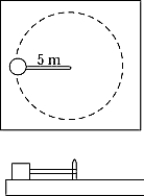
A) 3.2 m/s
B) 4.0 m/s
C) 10 m/s
D) 20 m/s
E) 0.20 km/s

A) 3.2 m/s
B) 4.0 m/s
C) 10 m/s
D) 20 m/s
E) 0.20 km/s

Unlock Deck
Unlock for access to all 119 flashcards in this deck.
Unlock Deck
k this deck
23
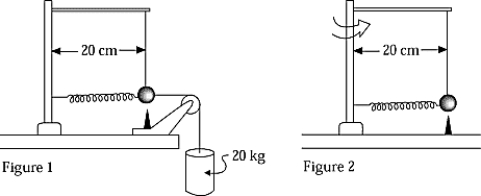 A 2-kg sphere attached to an axle by a spring is displaced from its rest position to a radius of 20 cm from the axle centerline by a standard mass of 20 kg, as in Figure 1. The same 2-kg sphere is also displaced 20 cm from the axle centerline, as in Figure 2, when the sphere is rotated at a speed of approximately
A 2-kg sphere attached to an axle by a spring is displaced from its rest position to a radius of 20 cm from the axle centerline by a standard mass of 20 kg, as in Figure 1. The same 2-kg sphere is also displaced 20 cm from the axle centerline, as in Figure 2, when the sphere is rotated at a speed of approximatelyA) 4.4 m/s
B) 9.8 m/s
C) 14 m/s
D) 98 m/s
E) 0.44 km/s

Unlock Deck
Unlock for access to all 119 flashcards in this deck.
Unlock Deck
k this deck
24
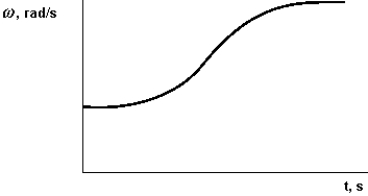 What physical quantity is represented by the slope of the curve shown on the graph?
What physical quantity is represented by the slope of the curve shown on the graph?A) displacement
B) angular acceleration
C) tangential acceleration
D) velocity
E) None of these is correct.

Unlock Deck
Unlock for access to all 119 flashcards in this deck.
Unlock Deck
k this deck
25
A turntable rotating at 8.0 rad/s slows to a stop in 10 s. If the acceleration is constant, the angle through which the turntable rotates in the 10 s is
A) 0.80 rad
B) 0.40 rad
C) 40 rad
D) 80 rad
E) 16 rad
A) 0.80 rad
B) 0.40 rad
C) 40 rad
D) 80 rad
E) 16 rad

Unlock Deck
Unlock for access to all 119 flashcards in this deck.
Unlock Deck
k this deck
26
The angular acceleration of the flywheel of a generator is given by
(t) = 6bt - 12ct2
Where b and c are constants and is in rad/s2 provided t is in seconds. If the initial angular velocity is taken to be 0, the angular velocity at time t is given by
A) 0 + 6bt2 - 12ct3
B) 6b - 24ct
C) 3bt2 - 4ct3 + 0
D) 3bt2 - 4ct3
E) 6b - 24ct + 0
(t) = 6bt - 12ct2
Where b and c are constants and is in rad/s2 provided t is in seconds. If the initial angular velocity is taken to be 0, the angular velocity at time t is given by
A) 0 + 6bt2 - 12ct3
B) 6b - 24ct
C) 3bt2 - 4ct3 + 0
D) 3bt2 - 4ct3
E) 6b - 24ct + 0

Unlock Deck
Unlock for access to all 119 flashcards in this deck.
Unlock Deck
k this deck
27
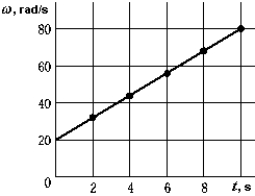 The data used to construct the graph were taken from the tachometer of an airplane. The angular acceleration during the 10 s interval was
The data used to construct the graph were taken from the tachometer of an airplane. The angular acceleration during the 10 s interval wasA) 3.0 rad/s2
B) 6.0 rad/s2
C) 8.0 rad/s2
D) 20 rad/s2
E) 38 rad/s2

Unlock Deck
Unlock for access to all 119 flashcards in this deck.
Unlock Deck
k this deck
28
A wheel starting from rest has a constant angular acceleration. After 3.0 s the angular velocity of the wheel is 7.5 rad/s. This same angular acceleration continues for a further 7.0 s after which it drops suddenly to zero. In the first 20.0 s how many revolutions does the wheel make?
A) 20
B) 40
C) 60
D) 80
E) 100
A) 20
B) 40
C) 60
D) 80
E) 100

Unlock Deck
Unlock for access to all 119 flashcards in this deck.
Unlock Deck
k this deck
29
A penny is placed 0.10 m from the center of a turntable. If the coefficient of static friction between the penny and the turntable is 0.50, the maximum linear speed at which the penny can travel without slipping is approximately
A) 0.49 m/s
B) 0.70 m/s
C) 1.3 m/s
D) 1.4 m/s
E) 0.20 km/s
A) 0.49 m/s
B) 0.70 m/s
C) 1.3 m/s
D) 1.4 m/s
E) 0.20 km/s

Unlock Deck
Unlock for access to all 119 flashcards in this deck.
Unlock Deck
k this deck
30
Which of the following statements about the motion of the second hand of a clock is true?
A) The tangential velocity of the tip is constant.
B) The angular velocity is zero.
C) The angular acceleration is zero.
D) The radial acceleration is zero.
E) The tangential acceleration is nonzero.
A) The tangential velocity of the tip is constant.
B) The angular velocity is zero.
C) The angular acceleration is zero.
D) The radial acceleration is zero.
E) The tangential acceleration is nonzero.

Unlock Deck
Unlock for access to all 119 flashcards in this deck.
Unlock Deck
k this deck
31
A serious audiophile prefers to listen to music on his vinyl record turntable. The 12-inch diameter disk rotates at a constant 33  rpm. How fast is the record passing by the pickup cartridge tip at a radius of 4 inches? (1 inch = 2.54 cm)
rpm. How fast is the record passing by the pickup cartridge tip at a radius of 4 inches? (1 inch = 2.54 cm)
A) 5.6 cm/s
B) 35 cm/s
C) 3.3 102 cm/s
D) 21 m/s
E) 18 cm/s
 rpm. How fast is the record passing by the pickup cartridge tip at a radius of 4 inches? (1 inch = 2.54 cm)
rpm. How fast is the record passing by the pickup cartridge tip at a radius of 4 inches? (1 inch = 2.54 cm)A) 5.6 cm/s
B) 35 cm/s
C) 3.3 102 cm/s
D) 21 m/s
E) 18 cm/s

Unlock Deck
Unlock for access to all 119 flashcards in this deck.
Unlock Deck
k this deck
32
In a fast rotating atomic nucleus the rate of rotation is related to the energy of the emitted gamma-ray according to the relationship "Egamma = 2hf," where h = Planck's constant, and f = rotational frequency. Find the period of rotation that corresponds to an energy of 0.75 MeV.
A) 1.2 10-14 s
B) 2.4 10-20 s
C) 8.5 1019 s
D) 1.7 1020 s
E) 1.2 10-20 s
A) 1.2 10-14 s
B) 2.4 10-20 s
C) 8.5 1019 s
D) 1.7 1020 s
E) 1.2 10-20 s

Unlock Deck
Unlock for access to all 119 flashcards in this deck.
Unlock Deck
k this deck
33
A solid sphere (I = 0.4MR2) of radius 0.06 m and mass 0.50 kg rolls without slipping 14m down a 30º inclined plane. At the bottom of the plane, the linear velocity of the center of mass of the sphere is approximately
A) 3.5 m/s
B) 3.9 m/s
C) 8.7 m/s
D) 18 m/s
E) 9.9 m/s
A) 3.5 m/s
B) 3.9 m/s
C) 8.7 m/s
D) 18 m/s
E) 9.9 m/s

Unlock Deck
Unlock for access to all 119 flashcards in this deck.
Unlock Deck
k this deck
34
The time period for the rotation of the conical pendulum moving in a horizontal circle (bob mass = M, string length L, and vertical half angle ; see figure) is given by the expression: 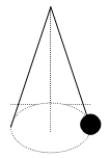
A) 2 {Lcos /g}1/2
B) 2 {Lsin /g}1/2
C) 2 Lcos /g
D) 2 Lsin /g
E) {2 Lcos /g}1/2

A) 2 {Lcos /g}1/2
B) 2 {Lsin /g}1/2
C) 2 Lcos /g
D) 2 Lsin /g
E) {2 Lcos /g}1/2

Unlock Deck
Unlock for access to all 119 flashcards in this deck.
Unlock Deck
k this deck
35
You give an orbiting satellite a command to rotate through an angle given by
= at + bt2 - ct4
Where a, b, and c are constants and is in radians if t is in seconds. What is the angular acceleration of this satellite at time t?
A) at
B) a + b - c
C) -12
D) 2b - 12ct2
E) zero
= at + bt2 - ct4
Where a, b, and c are constants and is in radians if t is in seconds. What is the angular acceleration of this satellite at time t?
A) at
B) a + b - c
C) -12
D) 2b - 12ct2
E) zero

Unlock Deck
Unlock for access to all 119 flashcards in this deck.
Unlock Deck
k this deck
36
A turntable has an angular velocity of 1.4 rad/s. The coefficient of static friction between the turntable and a block placed on it is 0.20. The maximum distance from the center of the turntable that the block can be placed without sliding is approximately
A) 0.50 m
B) 1.0 m
C) 1.4 m
D) 2.0 m
E) 4.4 m
A) 0.50 m
B) 1.0 m
C) 1.4 m
D) 2.0 m
E) 4.4 m

Unlock Deck
Unlock for access to all 119 flashcards in this deck.
Unlock Deck
k this deck
37
The Crab Pulsar rotates 30 times per second. However, its period is increasing by about 10-5 s per year. How many years will it take before its period of rotation has doubled?
A) 3.0 106 yr
B) 6.7 103 yr
C) 3.3 103 yr
D) 1.05 1010 yr
E) 2.10 1010 yr
A) 3.0 106 yr
B) 6.7 103 yr
C) 3.3 103 yr
D) 1.05 1010 yr
E) 2.10 1010 yr

Unlock Deck
Unlock for access to all 119 flashcards in this deck.
Unlock Deck
k this deck
38
A 0.3-kg object is being whirled in a horizontal circle at the end of a 1.5 m long string. If the string breaks when the number of revolutions per minute, rpm = 200, then find the maximum tension in the string.
A) 2.0 102 N
B) 59 N
C) 7.0 105 N
D) 9.0 N
E) 88 N
A) 2.0 102 N
B) 59 N
C) 7.0 105 N
D) 9.0 N
E) 88 N

Unlock Deck
Unlock for access to all 119 flashcards in this deck.
Unlock Deck
k this deck
39
The information on a compact disc is scanned by a laser initially at a radius of 2.4 cm and then out to a maximum of 6.0 cm. Because the dimensions of the pit information remains constant with radius the disk motor adjusts so that the tangential velocity remains a constant. What is the ratio of the inner to outer rotational frequencies?
A) 0.16
B) 6.3
C) 1.0
D) 2.5
E) 0.40
A) 0.16
B) 6.3
C) 1.0
D) 2.5
E) 0.40

Unlock Deck
Unlock for access to all 119 flashcards in this deck.
Unlock Deck
k this deck
40
The ball shown in the figure will loop-the-loop if it starts from a point high enough on the incline. When the ball is at point A, the centripetal force on it is best represented by which of the following vectors? 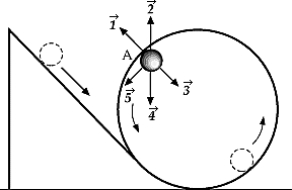
A)
B)
C)
D)
E)

A)

B)

C)

D)

E)


Unlock Deck
Unlock for access to all 119 flashcards in this deck.
Unlock Deck
k this deck
41
Four 50-g point masses are at the corners of a square with 20-cm sides. What is the moment of inertia of this system about an axis perpendicular to the plane of the square and passing through its center?
A) 1.0 10-3 kg · m2
B) 4.0 10-3 kg · m2
C) 2.0 10-3 kg · m2
D) 8.0 10-3 kg · m2
E) 2.8 10-3 kg · m2
A) 1.0 10-3 kg · m2
B) 4.0 10-3 kg · m2
C) 2.0 10-3 kg · m2
D) 8.0 10-3 kg · m2
E) 2.8 10-3 kg · m2

Unlock Deck
Unlock for access to all 119 flashcards in this deck.
Unlock Deck
k this deck
42
To increase the moment of inertia of a body about an axis, you must
A) increase the angular acceleration.
B) increase the angular velocity.
C) decrease the angular velocity.
D) make the body occupy less space.
E) place part of the body farther from the axis.
A) increase the angular acceleration.
B) increase the angular velocity.
C) decrease the angular velocity.
D) make the body occupy less space.
E) place part of the body farther from the axis.

Unlock Deck
Unlock for access to all 119 flashcards in this deck.
Unlock Deck
k this deck
43
The moment of inertia of a set of dumbbells, considered as two mass points m separated by a distance 2L about the axis AA, is 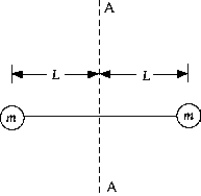
A) mL2
B) mL2
mL2
C) 2mL2
D) mL2
mL2
E) 4mL2

A) mL2
B)
 mL2
mL2 C) 2mL2
D)
 mL2
mL2 E) 4mL2

Unlock Deck
Unlock for access to all 119 flashcards in this deck.
Unlock Deck
k this deck
44
A spherical shell and a solid sphere (both of the same total mass) are rotating about a diameter at the same angular frequency and with the same rotational kinetic energy. What is the ratio of the spherical shell radius to the solid sphere (i.e., Rspherical shell/Rsolid sphere)?
A) (2/5)1/2
B) (3/10)1/2
C) (1/2)1/2
D) (3/5)1/2
E) (2/3)1/2
A) (2/5)1/2
B) (3/10)1/2
C) (1/2)1/2
D) (3/5)1/2
E) (2/3)1/2

Unlock Deck
Unlock for access to all 119 flashcards in this deck.
Unlock Deck
k this deck
45
A body of mass m is whirled at a constant angular velocity on the end of a string of length R. To double the kinetic energy of the body as it whirls while maintaining the angular velocity, the length of the string must be changed to
A) 2R
B)
C) R/2
D) 4R
E)
A) 2R
B)

C) R/2
D) 4R
E)


Unlock Deck
Unlock for access to all 119 flashcards in this deck.
Unlock Deck
k this deck
46
A wagon wheel consists of 8 spokes of uniform diameter, each of mass ms and length L cm. The outer ring has a mass mring. What is the moment of inertia of the wheel? Assume that each spoke extends from the center to the other ring and the ring is of negligible thickness. 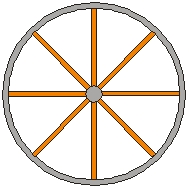
A)
B)
C)
D)
E)

A)

B)

C)

D)

E)


Unlock Deck
Unlock for access to all 119 flashcards in this deck.
Unlock Deck
k this deck
47
The disc brake of a high performance car is often made of carbon fiber instead of iron, thereby reducing the mass. If the mass of a carbon disc is  that of iron for the same shape and size, by what factor is the moment of inertia changed?
that of iron for the same shape and size, by what factor is the moment of inertia changed?
A) one quarter
B) half
C) unchanged
D) doubled
E) quadrupled
 that of iron for the same shape and size, by what factor is the moment of inertia changed?
that of iron for the same shape and size, by what factor is the moment of inertia changed?A) one quarter
B) half
C) unchanged
D) doubled
E) quadrupled

Unlock Deck
Unlock for access to all 119 flashcards in this deck.
Unlock Deck
k this deck
48
Power can be expressed as the product of
A) force and displacement.
B) torque and angular displacement.
C) torque and angular acceleration.
D) force and acceleration.
E) torque and angular velocity.
A) force and displacement.
B) torque and angular displacement.
C) torque and angular acceleration.
D) force and acceleration.
E) torque and angular velocity.

Unlock Deck
Unlock for access to all 119 flashcards in this deck.
Unlock Deck
k this deck
49
The disc brakes of a high performance car are often made of carbon fiber instead of iron, thereby reducing the mass. If both types of discs are of the same size and shape, and each iron disc has a mass of 4 kg and each carbon disc has a mass of 1 kg, what is the reduction in rotational kinetic energy at 72 km/h if all the four iron discs in the car are replaced with carbon discs?
A) 300 J
B) 400 J
C) 800 J
D) 1200 J
E) 1600 J
A) 300 J
B) 400 J
C) 800 J
D) 1200 J
E) 1600 J

Unlock Deck
Unlock for access to all 119 flashcards in this deck.
Unlock Deck
k this deck
50
A thin solid disk of radius R = 0.5 m and mass M = 2.0 kg is rolling without slipping on a horizontal surface with a linear speed v = 5.0 m/s. The disk now rolls without slipping up an inclined plane that is at an angle of 60 degrees to the vertical. Calculate the maximum height that the disk rolls up the incline.
A) 5.1 m
B) 2.6 m
C) 2.9 m
D) 3.1 m
E) 1.3 m
A) 5.1 m
B) 2.6 m
C) 2.9 m
D) 3.1 m
E) 1.3 m

Unlock Deck
Unlock for access to all 119 flashcards in this deck.
Unlock Deck
k this deck
51
The amount of work done on a rotating body can be expressed in terms of the product of
A) force and lever arm.
B) torque and angular velocity.
C) torque and angular acceleration.
D) force and time of application of the force.
E) torque and angular displacement.
A) force and lever arm.
B) torque and angular velocity.
C) torque and angular acceleration.
D) force and time of application of the force.
E) torque and angular displacement.

Unlock Deck
Unlock for access to all 119 flashcards in this deck.
Unlock Deck
k this deck
52
A solid sphere of radius r = 5 cm and mass m = 0.2 kg rolls in a groove as shown. The angle, , between the points of contact with the groove is 120 . If the sphere has a linear velocity of 10 mm/s, what is the rotational kinetic energy? 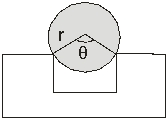
A) 0.8 mJ
B) 1.0 mJ
C) 1.6 mJ
D) 2.0 mJ
E) undetermined.

A) 0.8 mJ
B) 1.0 mJ
C) 1.6 mJ
D) 2.0 mJ
E) undetermined.

Unlock Deck
Unlock for access to all 119 flashcards in this deck.
Unlock Deck
k this deck
53
A hoop of mass 50 kg rolls without slipping. If the center-of-mass of the hoop has a translational speed of 4.0 m/s, the total kinetic energy of the hoop is
A) 0.20 kJ
B) 0.40 kJ
C) 1.1 kJ
D) 3.9 kJ
E) None of these is correct.
A) 0.20 kJ
B) 0.40 kJ
C) 1.1 kJ
D) 3.9 kJ
E) None of these is correct.

Unlock Deck
Unlock for access to all 119 flashcards in this deck.
Unlock Deck
k this deck
54
A ball of mass m1, connected to another mass m2 by a string, is whirled at a constant speed in a horizontal circle of radius R equal to 0.800m. If the mass m2 = 5.00 kg, the kinetic energy of the ball is 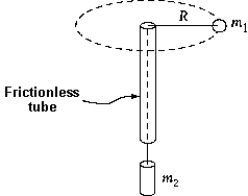
A) 0.981 J
B) 2.45 J
C) 4.90 J
D) 19.6 J
E) 39.2 J

A) 0.981 J
B) 2.45 J
C) 4.90 J
D) 19.6 J
E) 39.2 J

Unlock Deck
Unlock for access to all 119 flashcards in this deck.
Unlock Deck
k this deck
55
The moment of inertia of a slim rod about a transverse axis through one end is mL2/3, where m is the mass of the rod and L is its length. The moment of inertia of a 0.24-kg meterstick about a transverse axis through its center is
A) 0.14 kg · m2
B) 20 kg · m2
C) 0.020 kg · m2
D) 80 kg · m2
E) 4.5 kg · m2
A) 0.14 kg · m2
B) 20 kg · m2
C) 0.020 kg · m2
D) 80 kg · m2
E) 4.5 kg · m2

Unlock Deck
Unlock for access to all 119 flashcards in this deck.
Unlock Deck
k this deck
56
The moment of inertia of a certain cylinder, whose mass is not distributed uniformly, is 0.6mR2 about its geometric axis. The translational speed of the center of mass after it starts from rest and rolls 14 m down a 30º incline is approximately
A) 9.3 m/s
B) 86 m/s
C) 13 m/s
D) 3.1 m/s
E) 41 m/s
A) 9.3 m/s
B) 86 m/s
C) 13 m/s
D) 3.1 m/s
E) 41 m/s

Unlock Deck
Unlock for access to all 119 flashcards in this deck.
Unlock Deck
k this deck
57
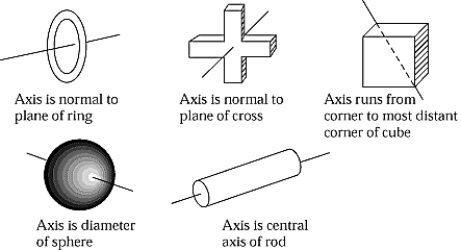 If all of the objects illustrated in the figure have equal masses, the moment of inertia about the indicated axis is largest for the
If all of the objects illustrated in the figure have equal masses, the moment of inertia about the indicated axis is largest for theA) ring
B) cross
C) sphere
D) cube
E) rod

Unlock Deck
Unlock for access to all 119 flashcards in this deck.
Unlock Deck
k this deck
58
A cylinder (I = ½mR2) rolls along a level floor with a speed v. The work required to stop this cylinder is
A) ¼ mv2
B) ½ mv2
C) ¾ mv2
D) mv2
E) 1.25mv2
A) ¼ mv2
B) ½ mv2
C) ¾ mv2
D) mv2
E) 1.25mv2

Unlock Deck
Unlock for access to all 119 flashcards in this deck.
Unlock Deck
k this deck
59
The moment of inertia of a slim rod of mass m and length L about a transverse axis through one end is mL2/3. The moment of inertia of such a rod about a transverse axis through the rod at a distance L/3 from one end is
A) mL2/36
B) 7mL2/36
C) mL2/9
D) 2mL2/9
E) 4mL2/9
A) mL2/36
B) 7mL2/36
C) mL2/9
D) 2mL2/9
E) 4mL2/9

Unlock Deck
Unlock for access to all 119 flashcards in this deck.
Unlock Deck
k this deck
60
A homogeneous solid cylinder of mass m, length L, and radius R rotates about an axis through point P, which is parallel to the cylinder axis. If the moment of inertia about the cylinder axis is  mR2, the moment of inertia about the axis through P is
mR2, the moment of inertia about the axis through P is 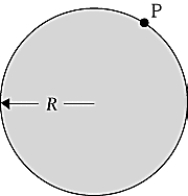
A) 0.4mR2
B) mR2
mR2
C) 2/3 mR2
D) mR2
E) 1.5mR2
 mR2, the moment of inertia about the axis through P is
mR2, the moment of inertia about the axis through P is 
A) 0.4mR2
B)
 mR2
mR2 C) 2/3 mR2
D) mR2
E) 1.5mR2

Unlock Deck
Unlock for access to all 119 flashcards in this deck.
Unlock Deck
k this deck
61
What constant torque, in the absence of friction, must be applied to a wheel to give it an angular velocity of 50 rad/s if it starts from rest and is accelerated for 10 s? The moment of inertia of the wheel about its axle is 9.0 kg · m2.
A) 4.5 N · m
B) 9.0 N · m
C) 45 N · m
D) 30 N · m
E) 60 N · m
A) 4.5 N · m
B) 9.0 N · m
C) 45 N · m
D) 30 N · m
E) 60 N · m

Unlock Deck
Unlock for access to all 119 flashcards in this deck.
Unlock Deck
k this deck
62
A uniform disk (Io = ½ mR2) of mass m and radius R is suspended from a point on its rim. The moment of inertia of the disk about an axis perpendicular to the disk through the pivot point is
A) ½ mR2
B) mR2
C) 1.5mR2
D) 2mR2
E) 2mR2/3
A) ½ mR2
B) mR2
C) 1.5mR2
D) 2mR2
E) 2mR2/3

Unlock Deck
Unlock for access to all 119 flashcards in this deck.
Unlock Deck
k this deck
63
Water is drawn from a well in a bucket tied to the end of a rope whose other end wraps around a solid cylinder of mass 50 kg and diameter 25 cm. As this cylinder is turned with a crank, the rope raises the bucket. The mass of a bucket of water is 20 kg. Someone cranks the bucket up and then lets go of the crank, and the bucket of water falls down to the bottom of the well. Without friction or air resistance, what is the angular acceleration of the 50-kg cylinder?
A) 1.1 102 rad/s2
B) 3.6 rad/s2
C) 35 rad/s2
D) 63 rad/s2
E) 17 rad/s2
A) 1.1 102 rad/s2
B) 3.6 rad/s2
C) 35 rad/s2
D) 63 rad/s2
E) 17 rad/s2

Unlock Deck
Unlock for access to all 119 flashcards in this deck.
Unlock Deck
k this deck
64
A 7.00-kg mass and a 4.00-kg mass are mounted on a spindle free to turn about the x axis as shown. Assume the mass of the arms and the spindle to be negligible. The rotational inertia of this system is approximately 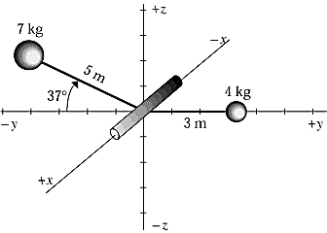
A) 44.0 kg · m2
B) 47.0 kg · m2
C) 99.0 kg · m2
D) 148 kg · m2
E) 211 kg · m2

A) 44.0 kg · m2
B) 47.0 kg · m2
C) 99.0 kg · m2
D) 148 kg · m2
E) 211 kg · m2

Unlock Deck
Unlock for access to all 119 flashcards in this deck.
Unlock Deck
k this deck
65
A disc is free to rotate about an axis. A force applied at a distance d from the axis causes an angular acceleration . What angular acceleration is produced if the same force is applied a distance 2d from the axis?
A)
B) 2
C) /2
D) 4
E) /4
A)
B) 2
C) /2
D) 4
E) /4

Unlock Deck
Unlock for access to all 119 flashcards in this deck.
Unlock Deck
k this deck
66
The rotational inertia of an object about an axis depends on the
A) angular velocity about the axis.
B) angular acceleration about the axis.
C) mass distribution about the axis.
D) torque about the axis.
E) linear acceleration about the axis.
A) angular velocity about the axis.
B) angular acceleration about the axis.
C) mass distribution about the axis.
D) torque about the axis.
E) linear acceleration about the axis.

Unlock Deck
Unlock for access to all 119 flashcards in this deck.
Unlock Deck
k this deck
67
A 7.00-kg mass and a 4.00-kg mass are mounted on a spindle that is free to turn about the x axis as shown. Assume the mass of the arms and the spindle to be negligible. The magnitude of the resultant torque is approximately 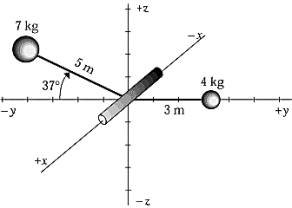
A) 82.2 N · m
B) 157 N · m
C) 225 N · m
D) 392 N · m
E) 461 N · m

A) 82.2 N · m
B) 157 N · m
C) 225 N · m
D) 392 N · m
E) 461 N · m

Unlock Deck
Unlock for access to all 119 flashcards in this deck.
Unlock Deck
k this deck
68
A bicycle wheel, a hollow sphere, and a solid sphere each have the same mass and radius. They each rotate about an axis through their centers. Which has the greatest moment of inertia and which has the least?
A) The wheel has the greatest; the solid sphere has the least.
B) The wheel has the greatest; the hollow sphere has the least.
C) The hollow sphere has the greatest; the solid sphere has the least.
D) The hollow sphere has the greatest; the wheel has the least.
E) The solid sphere has the greatest; the hollow sphere has the least.
A) The wheel has the greatest; the solid sphere has the least.
B) The wheel has the greatest; the hollow sphere has the least.
C) The hollow sphere has the greatest; the solid sphere has the least.
D) The hollow sphere has the greatest; the wheel has the least.
E) The solid sphere has the greatest; the hollow sphere has the least.

Unlock Deck
Unlock for access to all 119 flashcards in this deck.
Unlock Deck
k this deck
69
A disk with a radius of 1.5 m whose moment of inertia is 34 kg · m2 is caused to rotate by a force of 160 N tangent to the circumference. The angular acceleration of the disk is approximately
A) 0.14 rad/s2
B) 0.23 rad/s2
C) 4.4 rad/s2
D) 7.1 rad/s2
E) 23 rad/s2
A) 0.14 rad/s2
B) 0.23 rad/s2
C) 4.4 rad/s2
D) 7.1 rad/s2
E) 23 rad/s2

Unlock Deck
Unlock for access to all 119 flashcards in this deck.
Unlock Deck
k this deck
70
A wheel slows from 20 rad/s to 12 rad/s in 5 s under the influence of a constant frictional torque. In these 5 s, the wheel turns through an angle of
A) 2.4 rad
B) 43 rad
C) 60 rad
D) 80 rad
E) 100 rad
A) 2.4 rad
B) 43 rad
C) 60 rad
D) 80 rad
E) 100 rad

Unlock Deck
Unlock for access to all 119 flashcards in this deck.
Unlock Deck
k this deck
71
A solid disk (I =  MR2) that is 10 cm in diameter has a mass of 4 kg. The force applied at the outer surface required to produce an angular acceleration of 6 rad/s2 about an axis through the center of the disc is
MR2) that is 10 cm in diameter has a mass of 4 kg. The force applied at the outer surface required to produce an angular acceleration of 6 rad/s2 about an axis through the center of the disc is
A) 0.24 kN
B) 0.12 kN
C) 0.30 N
D) 0.60 N
E) 1.2 N
 MR2) that is 10 cm in diameter has a mass of 4 kg. The force applied at the outer surface required to produce an angular acceleration of 6 rad/s2 about an axis through the center of the disc is
MR2) that is 10 cm in diameter has a mass of 4 kg. The force applied at the outer surface required to produce an angular acceleration of 6 rad/s2 about an axis through the center of the disc isA) 0.24 kN
B) 0.12 kN
C) 0.30 N
D) 0.60 N
E) 1.2 N

Unlock Deck
Unlock for access to all 119 flashcards in this deck.
Unlock Deck
k this deck
72
Two small masses, mA = 4.0 10-3 kg and mB = 2.0 10-3 kg, are connected by a 1.0-m rod of negligible mass. The angular acceleration about B produced by a force of 0.016 N applied at A is approximately 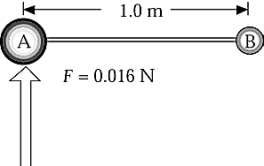
A) 4.0 rad/s2
B) 2.7 rad/s2
C) 11 rad/s2
D) 12 rad/s2
E) 4.0 102 rad/s2

A) 4.0 rad/s2
B) 2.7 rad/s2
C) 11 rad/s2
D) 12 rad/s2
E) 4.0 102 rad/s2

Unlock Deck
Unlock for access to all 119 flashcards in this deck.
Unlock Deck
k this deck
73
Water is drawn from a well in a bucket tied to the end of a rope whose other end wraps around a cylinder of mass 50 kg and diameter 25 cm. As you turn this cylinder with a crank, the rope raises the bucket. If the mass of a bucket of water is 20 kg, what torque must you apply to the crank to raise the bucket of water at a constant speed?
A) 24 N · m
B) 2.5 N · m
C) 80 N · m
D) 2.4 103 N · m
E) 49 N · m
A) 24 N · m
B) 2.5 N · m
C) 80 N · m
D) 2.4 103 N · m
E) 49 N · m

Unlock Deck
Unlock for access to all 119 flashcards in this deck.
Unlock Deck
k this deck
74
A solid uniform sphere has a density of 3000 kg/m3 when the radius is equal to 0.6 m. If the mass stayed the same but the radius tripled in size, what would the new moment of inertia be for the sphere?
A) 98.0 kg.m2
B) 879 kg.m2
C) 294 kg.m2
D) 196 kg.m2
E) 2650 kg.m2
A) 98.0 kg.m2
B) 879 kg.m2
C) 294 kg.m2
D) 196 kg.m2
E) 2650 kg.m2

Unlock Deck
Unlock for access to all 119 flashcards in this deck.
Unlock Deck
k this deck
75
Torque is defined as
A) a force tending to cause rotation.
B) the cross product of force and displacement.
C) the product of the force and the angular displacement.
D) the product of the force and the angular velocity.
E) the rotational work done.
A) a force tending to cause rotation.
B) the cross product of force and displacement.
C) the product of the force and the angular displacement.
D) the product of the force and the angular velocity.
E) the rotational work done.

Unlock Deck
Unlock for access to all 119 flashcards in this deck.
Unlock Deck
k this deck
76
A solid cylinder has a moment of inertia of 2 kg · m2. It is at rest at time zero when a net torque given by
= 6t2 + 6 (SI units)
Is applied. After 2 s, the angular velocity of the cylinder will be
A) 3.0 rad/s
B) 12 rad/s
C) 14 rad/s
D) 24 rad/s
E) 28 rad/s
= 6t2 + 6 (SI units)
Is applied. After 2 s, the angular velocity of the cylinder will be
A) 3.0 rad/s
B) 12 rad/s
C) 14 rad/s
D) 24 rad/s
E) 28 rad/s

Unlock Deck
Unlock for access to all 119 flashcards in this deck.
Unlock Deck
k this deck
77
A stone of mass 10 kg has a rotational inertia of 2.4 kg · m2 about an axis A parallel to an axis through the center of mass. If axis A is 0.20m from the center of mass axis, the rotational inertia about the center of mass axis is 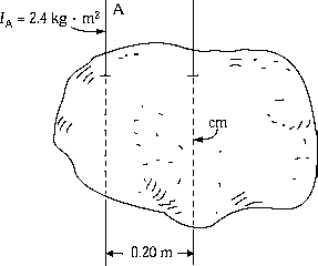
A) 0.40 kg · m2
B) 2.0 kg · m2
C) 2.4 kg · m2
D) 2.8 kg · m2
E) 4.4 kg · m2

A) 0.40 kg · m2
B) 2.0 kg · m2
C) 2.4 kg · m2
D) 2.8 kg · m2
E) 4.4 kg · m2

Unlock Deck
Unlock for access to all 119 flashcards in this deck.
Unlock Deck
k this deck
78
A uniform stick 1 m long is placed horizontally on the ground along an east-west axis. A force of 1.0 N is applied to the center of the stick in a direction 30º west of north. The torque exerted by the force relative to the east end of the stick is
A) zero.
B) 0.25 m, clockwise.
C) 0.43 m, clockwise.
D) 0.25 m, counterclockwise.
E) 0.43 m, counterclockwise.
A) zero.
B) 0.25 m, clockwise.
C) 0.43 m, clockwise.
D) 0.25 m, counterclockwise.
E) 0.43 m, counterclockwise.

Unlock Deck
Unlock for access to all 119 flashcards in this deck.
Unlock Deck
k this deck
79
In the figure, R1 = R2 and cm is the center of mass. The rotational inertia about an axis through point P1 is I1, the rotational inertia about an axis through point P2 is I2, and the rotational inertia about an axis through the cm is Icm. The relationship among the moments is 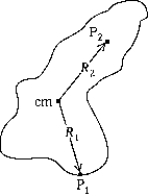
A) I1 = I2 > Icm
B) I1 = I2 < Icm
C) I1 > I2 > Icm
D) I1 < Icm > I2
E) I1 = I2 = Icm

A) I1 = I2 > Icm
B) I1 = I2 < Icm
C) I1 > I2 > Icm
D) I1 < Icm > I2
E) I1 = I2 = Icm

Unlock Deck
Unlock for access to all 119 flashcards in this deck.
Unlock Deck
k this deck
80
A disc-shaped grindstone of mass 3.0 kg and radius 8.0 cm is spinning at 600 rev/min. After the power is shut off, a man continues to sharpen his axe by holding it against the grindstone until it stops 10 s later. What is the average torque exerted by the axe on the grindstone?
A) 9.6 mN · m
B) 0.12 N · m
C) 0.75 N · m
D) 0.60 kN · m
E) 0.060 N · m
A) 9.6 mN · m
B) 0.12 N · m
C) 0.75 N · m
D) 0.60 kN · m
E) 0.060 N · m

Unlock Deck
Unlock for access to all 119 flashcards in this deck.
Unlock Deck
k this deck


